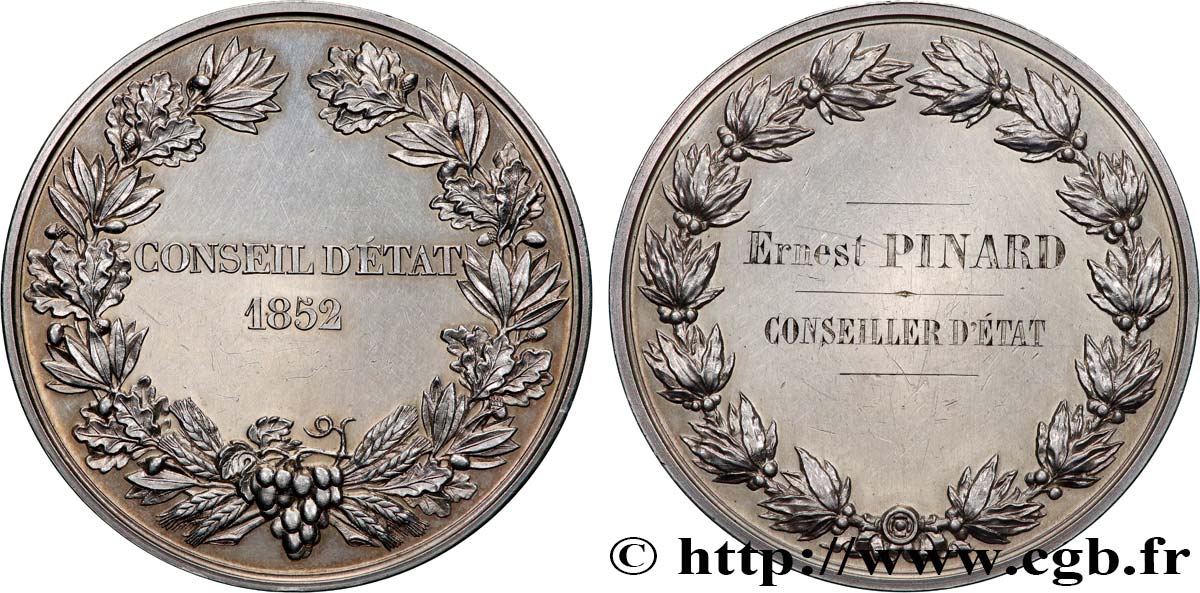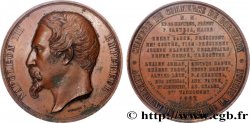Live auction - fme_878519 - SECOND EMPIRE Médaille, Conseiller d’État
得先注册又得到批准才可以报价。为了报价注册. 客户应该得到公司允许,那种过程需要 48 个小时。别等出售结束那一天才登记。您报价的话等于您赞成买那物品,而且按« 保价 » 证明您接受 cgb.fr 因特网拍卖使用法.
报价时只可以出全数值欧元总额。物品描述也说明销售结束时间,结束后出价都不会生效。 报价命令转达有时变动,等到最后秒钟增加否决的可能会。想多了解的话请注意 因特网拍卖常问
最高出价方将支付18%的不含税的拍卖费用
最高出价方将支付18%的不含税的拍卖费用
| 估算 : | 200 € |
| 价格 : | 201 € |
| 最高出价 : | 201 € |
| 拍卖结束日期 : | 14 November 2023 16:43:14 |
| 竞拍人 : | 3 竞拍人 |
种类 Médaille, Conseiller d’État
日期: (1852)/1866
材质 silver
直径 50 mm
模子方针 12 h.
重量 65,20 g.
侧面 lisse + abeille ARGENT
印模 Abeille (1860 - 1880) ARGENT
关于品相的说明
Médaille ayant été nettoyée, présentant des coups et rayures, notamment au revers
正面
正面的文字 CONSEIL D’ETAT / 1852.
正面的说明书 Légende en 2 lignes dans une couronne de feuilles de chênes, olivier et épis de blé.
背面
背面的文字 ERNEST PINARD / - / CONSEILLER D’ETAT.
背面的说明书 Légende gravée en 2 lignes dans une couronne de laurier.
评论
A noter que cette médaille, au vue du poinçon figurant sur la tranche (abeille), est une frappe postérieure à la date indiquée à l’avers.
La médaille a été décernée à Ernest Pinard (1822-1909). Ce dernier fut notamment magistrat, procureur impérial, ministre de l'Intérieur. Il est connu pour ses réquisitoires contre deux écrivains aujourd'hui classiques de la littérature française : Gustave Flaubert (Madame Bovary) et Charles Baudelaire (Les Fleurs du mal).
Rallié à Louis-Napoléon Bonaparte, il devient successivement substitut à Troyes (1851), substitut du procureur impérial à Reims (1852) et enfin substitut au Parquet de la Seine (1853). Napoléon III, le nomme au Conseil d'État (1866) dont la principale fonction est la rédaction des projets de loi qui sont soumis à l'empereur avant discussion devant le Corps législatif. (cf. wikipedia). On peut donc supposer qu’il reçut la médaille à cette occasion, soit vers 1866.
Note that this medal, in view of the hallmark on the edge (bee), is a strike after the date indicated on the obverse. The medal was awarded to Ernest Pinard (1822-1909). The latter was notably a magistrate, imperial prosecutor, Minister of the Interior. He is known for his indictments against two writers who are now classics of French literature: Gustave Flaubert (Madame Bovary) and Charles Baudelaire (Les Fleurs du mal). Rallied to Louis-Napoléon Bonaparte, he successively became substitute in Troyes (1851), substitute of the imperial prosecutor in Reims (1852) and finally substitute at the Parquet of the Seine (1853). Napoleon III appointed him to the Council of State (1866) whose main function was the drafting of bills which were submitted to the emperor before discussion before the Legislative Body. (cf. wikipedia). We can therefore assume that he received the medal on this occasion, around 1866.
La médaille a été décernée à Ernest Pinard (1822-1909). Ce dernier fut notamment magistrat, procureur impérial, ministre de l'Intérieur. Il est connu pour ses réquisitoires contre deux écrivains aujourd'hui classiques de la littérature française : Gustave Flaubert (Madame Bovary) et Charles Baudelaire (Les Fleurs du mal).
Rallié à Louis-Napoléon Bonaparte, il devient successivement substitut à Troyes (1851), substitut du procureur impérial à Reims (1852) et enfin substitut au Parquet de la Seine (1853). Napoléon III, le nomme au Conseil d'État (1866) dont la principale fonction est la rédaction des projets de loi qui sont soumis à l'empereur avant discussion devant le Corps législatif. (cf. wikipedia). On peut donc supposer qu’il reçut la médaille à cette occasion, soit vers 1866.
Note that this medal, in view of the hallmark on the edge (bee), is a strike after the date indicated on the obverse. The medal was awarded to Ernest Pinard (1822-1909). The latter was notably a magistrate, imperial prosecutor, Minister of the Interior. He is known for his indictments against two writers who are now classics of French literature: Gustave Flaubert (Madame Bovary) and Charles Baudelaire (Les Fleurs du mal). Rallied to Louis-Napoléon Bonaparte, he successively became substitute in Troyes (1851), substitute of the imperial prosecutor in Reims (1852) and finally substitute at the Parquet of the Seine (1853). Napoleon III appointed him to the Council of State (1866) whose main function was the drafting of bills which were submitted to the emperor before discussion before the Legislative Body. (cf. wikipedia). We can therefore assume that he received the medal on this occasion, around 1866.








 对产品描述纠错
对产品描述纠错 打印
打印 分享我的选择
分享我的选择 提问
提问 Consign / sell
Consign / sell
 产品介绍
产品介绍












